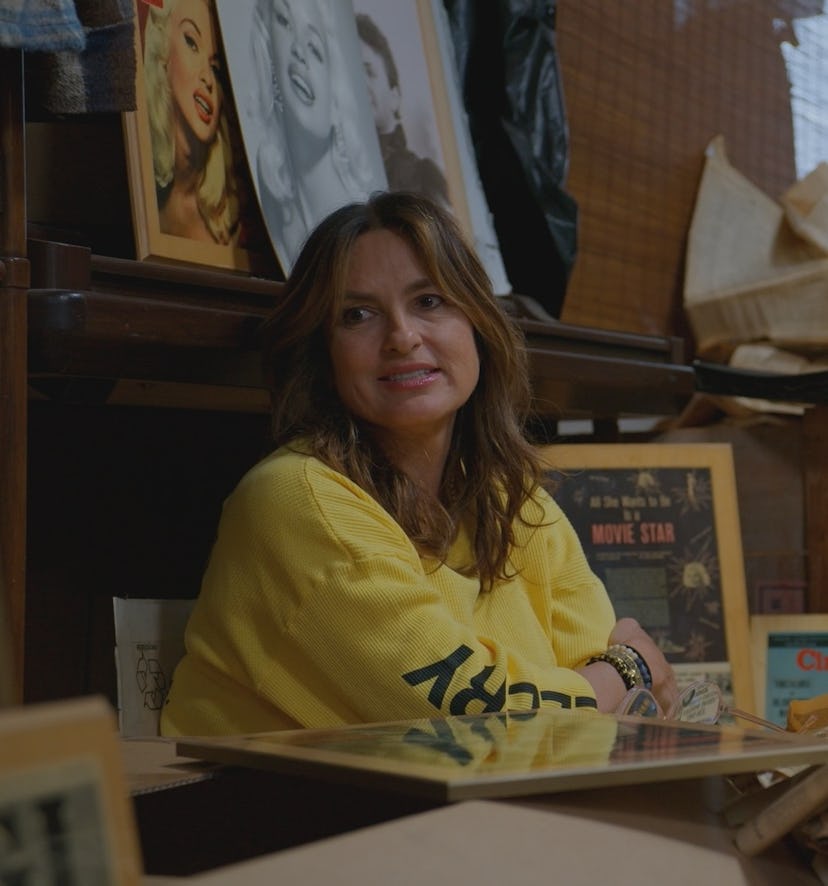Mariska Hargitay on the Myths of Her Mother, Jayne Mansfield, & Finally Telling Her Own Truth
With the documentary My Mom Jayne, Hargitay confronts the family secrets she spent a lifetime avoiding.

For over two decades, Mariska Hargitay has embodied strength and justice—on screen and off. Her 26-season (and counting) Emmy-winning run as Detective Olivia Benson on Law & Order: Special Victims Unit has made her a symbol of female empowerment, a position that inspired her to found the Joyful Heart Foundation in response to the outpouring of stories from fans who saw themselves in her character. Championing the stories of women has long been her life’s work, but as Hargitay entered her 60s, she realized she had never fully confronted her own.
In My Mom Jayne, her documentary streaming on HBO starting June 27, Hargitay turns the camera on herself—and the famous mother she barely knew. That would be Jayne Mansfield, the 1950s bombshell and screen siren who died in a car crash in 1967 at age 34, when Hargitay was just three years old. Hargitay and her brothers, who were in the backseat of the car, survived the crash and were raised by their father, Hungarian-born actor and former Mr. Universe Mickey Hargitay.
Where Mariska spent her career portraying a tough, compassionate advocate for victims, her mother was typecast as a hyper-feminized Marilyn Monroe-type sex symbol whose glamorous image belied a more complicated inner life. That legacy alone would be plenty to grapple with, but Hargitay also grew up sensing a difference between herself and her siblings, something she couldn’t quite name. Whispered rumors among Mansfield devotees about her paternity lingered for years. Then, in her twenties, Hargitay discovered the truth: her biological father is Italian singer Nelson Sardelli, a secret she has kept until now.
Mariska Hargitay with her mother, Jayne Mansfield.
Jayne Mansfield
“I’ve been working on this story my entire life,” Hargitay tells W via Zoom. Dressed in soft pink glasses and a cardigan to match, she radiated the warmth and authenticity that have made her portrayal of Benson so beloved. “What I learned, and what I had hoped, is that this is a universal film,” she says. “We all have complications in our families—stories hidden in the closet or things left unsaid.”
In My Mom Jayne, Hargitay embarks on an emotional excavation, attempting to understand the woman she long kept at arm’s length. Using archival footage of Mansfield—from her biggest roles in films like 1956’s The Girl Can’t Help It to private moments with her five children at home in Los Angeles—Hargitay pieces together a portrait of a star fighting for respect in Hollywood amid the rigid confines of the male gaze. There are some brutal scenes, like one where Mansfield, in an effort to rebrand from her baby-voiced blonde bimbo image into a serious actress, plays the classical violin on a talk show, only for the host to dismissively make a joke about kissing her instead.
Jayne Mansfield with her children Miklos, Zoltan and Mariska in 1967.
Growing up, Hargitay avoided her mother’s movies. “I never wanted to hear that voice,” she said. “It just undid me.” As she got older, her own vocal register dropped, perhaps, she reflects, as a subconscious rebellion. “She was put in a box,” Hargitay adds. “I was just never going to let anyone put me in a box.”
Making the film meant confronting not just the myth of Mansfield, but the resentment Hargitay had carried toward her mother for keeping Sardelli’s identity a secret. “It was an extraordinary experience, as a mother of three, to go from hating your mother, your dead mother, and thinking, ‘How could you leave me in this mess?’ To: ‘I see how complicated it was. I see how you were abandoned.’”
Mansfield holding six-weeks-old Hargitay in 1964.
Her decision to include Sardelli and his two daughters in the documentary came from a need for truth and integration. (Mickey Hargitay, who raised her, died in 2006.) “I realized it wasn’t mine to carry,” she says. “I didn’t want to teach my kids that—to go around saying, ‘Oh, he’s a family friend.’ It feels bad in your body, on a cellular level, when you say an untruth. To have your external and internal be incongruous is painful.”
Her goal now is to break the cycles of silence and shame that cloud family histories. What once seemed terrifying—the idea of digging into the past—turned out to be liberating. “After all the pain I went through in my life, I realized everyone did the best they could. I wasn’t abandoned. I wasn’t betrayed. It was complicated. I’m grateful I’m old enough to understand that, to see people in a three-dimensional way.”
That includes Mansfield. The letters, home videos, and photographs unearthed in the making of My Mom Jayne gave Hargitay a new sense of connection and forgiveness. “Seeing her navigate things, listening to her lower, deeper voice—I saw similarities between us that I’d never seen before,” Hargitay says through tears. “At the end of the movie, I say, ‘That’s who I see now, a powerful woman standing in all her glory, without any artifice or pose. It’s seeing what she built and what she had to fight against.’”
Hargitay with her husband, Peter Hermann and their three children at the Tribeca premiere of My Mom Jayne at Carnegie Hall.
At one point in the film, Mansfield expresses a never-realized dream to perform at Carnegie Hall. In a poetic full-circle moment, Hargitay held the My Mom Jayne premiere at that very venue. “It’s been a gift to be able to do that for her,” she says. “Because everybody wants to be seen for their true self. And no one saw her, right? They didn’t see what she was. So I got to see her. And that’s extraordinary.”